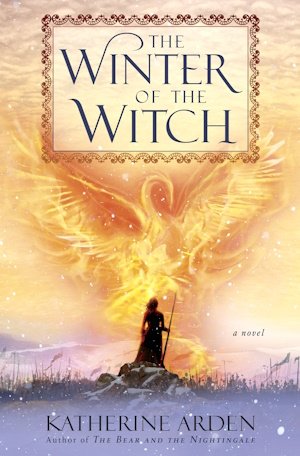“My life was the price of your freedom,” Vasya said. The lake was a cold presence at her back, the golden mare still stood warm and trembling beside her. “You cannot kill me.”
“I offered you your life,” said the Bear. “It is not my fault you are a stubborn fool and did not take it. My debt is paid. Besides, I am not going to kill you. You can join me alive. Or you can be my servant.”
His mouth quirked irrepressibly. “Less alive.”
VASYA HEARD A SOFT, shuffling footstep. Another. Vasya’s pulse sounded loud in her ears; in her mind echoed an old warning. The Bear is loose. Beware the dead.
“I am going to enjoy this,” said Medved. “Tell me what you decide.”
He stepped back. “Either way, I will give my brother your regrets.”
To her left, a dead man with red eyes and a filthy visage slunk into the light. To her right, a woman grinned, blood on her lips, a few locks of rotten hair still clinging to her bone-white skull. The dead things’ eyes were pits of hell: scarlet and black. When their mouths opened, the points of their teeth dazzled, sharp, in the last of the firelight. Vasya and the mare were surrounded by a shrinking half-circle.
The golden mare reared. For an instant, it seemed as though vast wings of flame flared from her back. But she came to earth, a horse still, and wounded. She couldn’t fly.
Vasya dropped her useless ax. Her soul was still full of remembered fire. She clenched her fists and forgot that the dead things were not burning.
It worked better than she could have hoped. Two went up like torches. The upyry screamed as they burned and blundered about, howling. She had to snatch up a branch and fend them off, her bare feet in the water. The golden mare backed up, striking out with frantic fore-hooves.
“Oh ho,” said the Bear, in a new voice. “Moscow put the fire in your soul, did it? Truly, you are half chaos-spirit; you would like being my ally. Won’t you reconsider?”
“Are you never silent?” Vasya demanded. Her body was streaming cold sweat. Another upyr burst into flames and reality began to waver. Now she understood. Magic makes men mad. They forget what is real because too much is possible.
But there were still four more; she had no choice. The dead things were advancing once more.
The Bear’s eye locked on hers, as though he could see the seed of insanity there. “Yes,” he breathed. “Lose your mind, wild girl. And you’ll be mine.”
She drew a deep breath and—
“Enough,” said a new voice.
The sound seemed to shake Vasya out of a dark dream. An old woman, big-handed and broad-shouldered, strode between the trees, took in the lurid scene, and said irritably, as though it were the most natural thing in the world, “Medved, you shouldn’t have tried it at midnight.”
At the same moment, a wave from the lake nearly swamped Vasya, and the bagiennik appeared, floating in the shallows, teeth bared.
“Eater, you didn’t say anything about hurting the horses.”
The old woman might have been tall once, but she was crabbed with age, her clothes rough, her hands long-nailed, her legs bowed.
There was a basket on her back.
Vasya, standing with her feet in the lake, reality gone pliant as mist, could see the Bear startled, wary. “You are dead,” he said to the old woman.
The old woman chortled. “At midnight? On my own lands? You should know better.”
Vasya, as though in a dream, thought she caught the gleam of the midnight-demon’s hair, her starry eyes, half-hidden in the trees, watching.
The Bear said, placating, “I should have known better. But why interfere? What care you for your traitorous family?”
“I care at least for the mare, you great hungry thing,” retorted the old woman. She stamped her foot. “Go back to terrorizing Muscovy.”
One of the upyry was creeping up behind the old woman. She didn’t look, didn’t even twitch, but the dead thing burst into white fire, and collapsed with a shriek.
“I suppose,” said the Bear, “I’d have to wait a long time for you to go mad.” There was respect in his voice. Vasya listened in astonishment.
“I have been mad for years,” said the old woman. When she laughed, every hair on Vasya’s body rose. “But at midnight, this is still my realm.”
“The girl won’t stay with you,” said the Bear, with a jerk of his chin at Vasya. “She won’t stay, however you try to persuade her. She’ll leave you just like the others. When she does, I’ll be waiting.” To Vasya, he added, “Your choice still stands. You are going to be my ally one way or the other. The chyerti will not have it otherwise.”
“Go away,” snapped the woman.
And, unbelievably, the Bear bowed to them both, and slunk away through the dark. His servants, shambling, the hell-light gone from their eyes, followed him.
13.
Baba Yaga
THE SOUNDS OF THE NIGHT resumed. Vasya’s feet were numb in the water. The golden mare’s head hung low. The old woman pursed her lips, inspecting girl and horse.
“Babushka,” said Vasya cautiously. “Thank you for our lives.”
“If you want to stand in the lake until you grow fins, that is your affair,” the old woman replied. “Otherwise come to the fire.”
She stumped away, added sticks to the blaze. Vasya waded out of the lake. But the mare did not move. “You are bleeding,” Vasya said to her, trying to get a look at the gash on her foreleg.
The mare’s ears were still pinned to her head. Finally, she said, I ran, while the others flew, to lead the upyry away. But they were too fast, and then my leg was torn and I could not fly.
“I can help you,” Vasya volunteered.

























